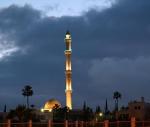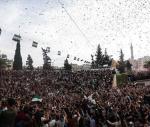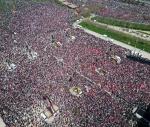KUWAIT — Kuwait’s policymakers face the uphill challenge of convincing citizens that despite hefty oil revenues, one of the world’s richest countries per capita needs to reduce spending to avoid a potential damaging budget deficit later this decade.
Long a topic of debate, the task has now fallen to new Finance Minister Anas Al Saleh, who said shortly after his appointment in January that a plan to review the lavish subsidy system should be ready later this year.
Thanks to subsidies, it costs as little as 5.2 dinars ($18.40) to fill an 80-litre petrol tank. Electricity costs just 2 fils (less than 1 US cent) per kilowatt hour, a fraction of what it costs to produce.
Economists say such cheap prices, available to Kuwaitis and foreigners alike, encourage waste. Building managers complain of people leaving their air conditioning on while they are on holiday so that their home is cool when they return.
But any marked reduction in subsidies could erode stability since Kuwaitis have a recent history of street protests and industrial action to voice dissatisfaction with the government of the US-allied Gulf Arab state.
“There will be a revolt in Kuwait,” said Abdullah Al Shayji, political science faculty chief at Kuwait University. “Kuwaitis will cope with anything, but don’t come too close to their wallets and chequebooks. They will really put up a big fight.”
In 2012, thousands of Kuwaitis marched against changes to voting rules and voiced anger about slow economic development. Public sector workers went on strike the same year over pay.
In a sign of how sensitive the subsidy subject is, Saleh has been on the defensive since announcing his plan, stressing that it will not hurt Kuwaitis with low and middle incomes.
“The government’s behaviour is very provocative for Kuwaitis because they don’t believe it,” said Shayji.
“You shouldn’t be touching this with a 10-foot pole at this stage, this is something that could sink the government,” he added. “Each Kuwaiti believes, deep down inside, he was raised to believe: I am entitled to the oil.”
In recent years, a steady rise in the oil price has helped the Organisation of Petroleum Exporting Countries (OPEC) producer pay for its growing wage bill, subsidies, a generous welfare system and a series of one-off handouts.
Such benefits, common in the Arab Gulf, are often credited with shielding Kuwait and its regional peers from the type of unrest which swept much of the Arab world in 2011.
They are difficult to reduce, despite warnings that spending at the current rate could outpace Kuwait’s revenues as early as 2017-18, according to the worst-case scenario from the International Monetary Fund.
“With risks to oil markets skewed to the downside, so are risks to the public finances,” said Farouk Soussa, chief Middle East economist at Citigroup, who says Kuwait needs to make progress on fiscal reform.
Enlightened new generation
Kuwait’s success with the subsidies review, or lack thereof, is relevant to other Gulf states which do not charge income tax and rely on a patronage-style system of handouts.
Work on the review started late last year in Kuwait, which relies on oil for over 90 per cent of revenues. Subsidies are expected to cost 5.11 billion dinars ($18.08 billion) next fiscal year to cover items like fuel and energy.
Saleh, who is in his early 40s, is part of a younger generation of ministers tasked with exploring such controversial economic reforms. He is the fourth finance minister in less than two years.
“He is one of a number of people who understands it. There are more people in the Cabinet who understand it now,” a diplomat said.
A former commerce and industry minister, Saleh helped push through a new companies law in 2012 aimed at boosting the private sector, a challenge in a country where implementing new systems takes years if not decades.
US-educated, with a business background, Saleh is taking a path backed by predecessor Sheikh Salem Abdul Aziz Al Sabah, who initiated the review and has led calls for spending cuts.
Sheikh Salem, who ran the central bank for 25 years, warned in January that the government would be forced to take damaging measures if spending continues unabated. He remarked that Kuwait might have to devalue the dinar or dip into its Future Generations Fund, a nest egg meant for economic shocks.
But many Kuwaitis are confused by the idea of shaving subsidies given the large budget surpluses of the past decade.
“Why do they do this? We have a lot of money and it is to our advantage. We should spend it,” said 20-year-old student Samaher Usama, who like more than half of Kuwaitis is under 25.
Some Kuwaitis see the logic in raising prices for goods and services, but they question the government’s method.
“They need to make a plan over five years and then look at developing different ways of producing electricity if they want to make it more expensive,” student Reem Al Asmi, 22, said.
She suggested Kuwait develop solar energy in order to reduce dependence on oil for its own energy consumption.
Talk about subsidies angers some who think Kuwait has been too generous abroad. It gave Egypt $4 billion as part of a Gulf aid package after the ousting of Islamist president Mohamed Mursi and donated $1 billion for humanitarian aid to Syria.
They also point to Kuwait’s potholed roads and housing shortage as evidence that the state is not using money effectively or that funds are disappearing elsewhere.
“There are influential people who take their fortune.” MP Saleh Ashour told parliament on February 4.
Some populist MPs are also part of the problem, campaigning to raise citizens’ benefits to win support from constituents.
MPs are calling for increases in allowances for housing and children. Last month they passed legislation to subsidise house-building materials.


















